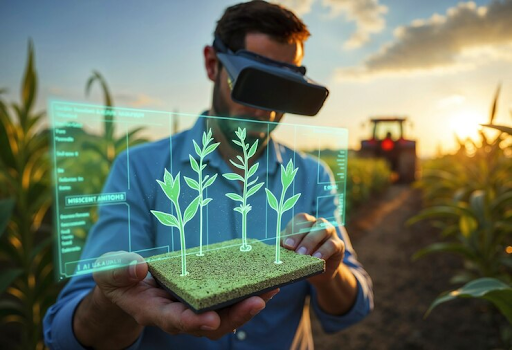With changes in tools and techniques, agriculture has also moved on. While going from ploughing manually to farming mechanically and taking the efficiency bar higher in successive generations of this industry, technology seems to play a far bigger role as it generates concepts like digital farming solutions, precision farming, and smart farming.
Though often used interchangeably, they have rather different meanings and applications. Below, we unpack the differences in digital, precision, and smart farming solutions, which will help you easily determine which works best for present agricultural needs.
What is Digital Farming?
Digital farming integrates digital tools and data analytics in farming practices. It emphasizes data collection, analysis, and use to improve the decision-making aspect of agriculture. Farmers make use of digital platforms, sensors, and AI-based analytics at each step of farming, from soil preparation to harvesting.
Key Features of Digital Farming
- Data-Driven Decisions: Farmers use digital platforms for monitoring soil health, crop growth, and weather conditions.
- Remote Monitoring: IoT sensors assist in tracking conditions in real time within the farms.
- Predictive Analytics: AI-powered analysis of previous data provides insights into pest control, irrigation needs, and harvest time.
- Supply Chain Optimization: Digital farming increases traceability to ensure better access and sustainability at the market levels.
Benefits
- It reduces guesswork in farming.
- Increases productivity in the right forecasting of the crops.
- Improves sustainability through optimized water and fertilizers usage.
What is Precision Farming?
Precision farming, also termed precision agriculture, is a methodology that focuses on the application of the right amounts of inputs-waters, fertilizers, and pesticides-at the right time and place. Waste is minimized with maximum efficiency achieved through the aid of advanced technologies such as GPS mapping, VRT, and satellite imagery.
Key Features of Precision Farming
- Site-Specific Crop Management (SSCM): Farmers use inputs based on real-time conditions in the fields rather than general methods.
- GPS and GIS Mapping: These technologies create detailed field maps for targeted resource applications.
- Variable Rate Technology (VRT): Adjusts fertilizer and pesticide application based on soil and crop conditions.
- Automated Equipment: Tractors and sprayers use GPS to operate with high accuracy.
Benefits
- Reduces input costs by avoiding overuse of fertilizers and pesticides.
- Improves soil health by minimizing chemical exposure.
- Increases yield by ensuring optimal crop care.
What is Smart Farming?
Smart farming is the most advanced form of agricultural technology, which involves AI, IoT, robotics, and automation. It surpasses mere data collection and precision techniques by way of totally automated farming environments, where machines, sensors, and software work in perfect harmony.
Key Features of Smart Farming
- AI-Powered Decision Making: Using artificial intelligence to give real-time suggestions and automate farm operations.
- IoT-Connected Devices: Sensors, drones, automated irrigation systems, etc., work in unison to optimize farm conditions.
- Blockchain for Traceability: Ensures food safety and supply chain transparency.
- Autonomous Machinery: AI-powered tractors, robotic harvesters, and automated drones handle labor-intensive tasks.
Benefits
- Reduces labor costs through automation.
- Enhances sustainability with precise resource management.
- Boosts profitability by increasing operational efficiency.
Digital vs. Precision vs. Smart Farming: How Do They Compare?
The main focus of digital farming is data collection and analytics, while precision farming emphasizes targeted resource application and smart farming integrates automation and AI-driven farming.
In terms of the technology applied, digital farming uses sensors, AI, and data platforms. Precision farming relies on GPS, GIS, VRT, and satellite imagery, while smart farming uses AI, IoT, robotics, and blockchain technology.
Regarding resource efficiency, while digital farming supports very high efficiency, precision farming enables extremely high efficiency, and smart farming ensures maximum efficiency by optimizing all ramifications of farm operations.
Automation also differs in its degree among the three approaches discussed: Digital farming offers a lower to medium automation degree and a medium one with precision farming, while smart farming exhibits the highest degree.
Digital farming is ideal for those looking to digitize farm management without requiring a large investment. Precision farming is best suited for those who want to optimize input usage and improve efficiency. Smart farming is most beneficial for large-scale or technology-driven farms that aim to achieve full automation and high operational efficiency.
Which Farming Approach is Best?
Digifarming, precision farming, and smart farming require an allocation depending on the size of the farm, budget, and level of technological preparedness.
- Small to Medium-Sized Farms: Digifarming models are best for small to medium-sized farms as the value obtained is without much cost, being a starting point.
- Farms Looking to Optimize Input Usage: Farms that want to develop the reduction of inputs but see yield increases
- Large-scale tech-savvy farms: Smart farming is the most enhanced automation, which brings efficiency.
Conclusion
As agriculture transitions into a data-driven future, digital farming solutions can help farmers improve productivity, sustainability, and profitability. Through digital tools, precision techniques, or smart automation, technology is shaping farming like never before.
At ASQI, we are committed to bringing cutting-edge agricultural innovations to farmers. Our tech-enabled solutions help farmers access expert advisory services, enhance market reach, and verify sustainable practices. Embracing digital farming solutions will pave the way for a more efficient and sustainable future.







